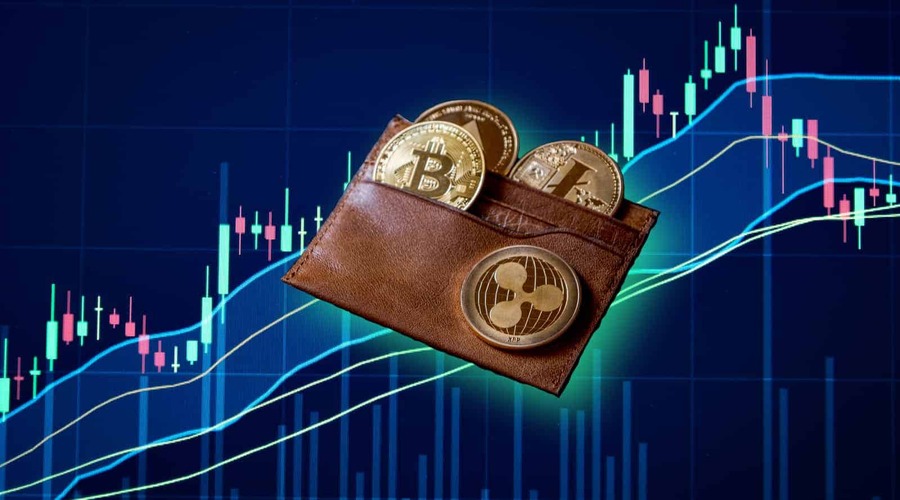Risks of Leaving Your Cryptocurrency on an Exchange Wallet

The Risks of Leaving Your Cryptocurrency on an Exchange Wallet
Cryptocurrencies have been gaining popularity over the past few years, and more and more people are investing in them. However, with the rise in popularity comes an increase in risks. One of the biggest risks is leaving your cryptocurrency on an exchange wallet. In this article, we will discuss the risks associated with leaving your cryptocurrency on an exchange wallet and provide some tips on how to keep your cryptocurrency safe.
What is an Exchange Wallet?
Before we dive into the risks of leaving your cryptocurrency on an exchange wallet, let’s first define what an exchange wallet is. An exchange wallet is a digital wallet that is provided a cryptocurrency exchange. When you buy cryptocurrency on an exchange, it is stored in an exchange wallet.
Risks of Leaving Your Cryptocurrency on an Exchange Wallet
Risk #1: Exchange Hacks
One of the biggest risks of leaving your cryptocurrency on an exchange wallet is the possibility of exchange hacks. Cryptocurrency exchanges are prime targets for hackers because they hold large amounts of cryptocurrency. In the past, there have been many high-profile exchange hacks where millions of dollars worth of cryptocurrency were stolen.
Risk #2: Insider Threats
Another risk of leaving your cryptocurrency on an exchange wallet is the possibility of insider threats. Cryptocurrency exchanges have employees who have access to the exchange’s wallets. In some cases, these employees may steal cryptocurrency from the exchange’s wallets.
Risk #3: Exchange Bankruptcy
Another risk of leaving your cryptocurrency on an exchange wallet is the possibility of exchange bankruptcy. If an exchange goes bankrupt, it may not be able to return your cryptocurrency to you. In some cases, the exchange may even sell your cryptocurrency to pay off its debts.
Risk #4: Lack of Control
When you leave your cryptocurrency on an exchange wallet, you are giving up control of your cryptocurrency. The exchange controls the private keys to your cryptocurrency, which means they have control over your funds. If the exchange decides to freeze your account or deny you access to your funds, you may not be able to do anything about it.
Tips for Keeping Your Cryptocurrency Safe
Now that we’ve discussed the risks of leaving your cryptocurrency on an exchange wallet, let’s talk about some tips for keeping your cryptocurrency safe.
Tip #1: Use a Hardware Wallet
One of the best ways to keep your cryptocurrency safe is to use a hardware wallet. A hardware wallet is a physical device that stores your private keys offline. This means that your cryptocurrency is not connected to the internet, which makes it much more difficult for hackers to steal your funds.
Tip #2: Use Two-Factor Authentication
Another way to keep your cryptocurrency safe is to use two-factor authentication. Two-factor authentication adds an extra layer of security to your account requiring a second form of authentication, such as a code sent to your phone, in addition to your password.
Tip #3: Keep Your Private Keys Safe
If you do decide to use an exchange wallet, it’s important to keep your private keys safe. You should never share your private keys with anyone, and you should always keep them in a secure location.
Tip #4: Spread Your Funds Across Multiple Wallets
Another way to keep your cryptocurrency safe is to spread your funds across multiple wallets. This way, if one wallet is compromised, you won’t lose all of your funds.
Tip #5: Stay Informed
Finally, it’s important to stay informed about the latest security risks and trends in the cryptocurrency industry. By staying informed, you can take proactive steps to protect your cryptocurrency.
Advantages of Using an Exchange Wallet
While there are many risks associated with leaving your cryptocurrency on an exchange wallet, there are also some advantages to using this type of wallet.
Advantage #1: Convenience
One of the biggest advantages of using an exchange wallet is convenience. When you buy cryptocurrency on an exchange, it is automatically stored in your exchange wallet. This eliminates the need to set up a separate wallet and transfer your funds, which can be time-consuming.
Advantage #2: Trading Options
When you use an exchange wallet, you have access to a variety of trading options. You can buy and sell cryptocurrencies, trade them for other cryptocurrencies, and even use them to make purchases. This makes it easy to manage your cryptocurrency investments in one place.
Advantage #3: Lower Fees
Using an exchange wallet can also be cost-effective. Many exchanges offer lower fees for buying and selling cryptocurrencies when you use their exchange wallet. This can help you save money on fees over time.
Types of Exchange Wallets
Not all exchange wallets are created equal. There are several types of exchange wallets, each with its own advantages and disadvantages.
Type #1: Hot Wallets
A hot wallet is a wallet that is connected to the internet. While this type of wallet is convenient for making trades and transactions, it is also more vulnerable to hacking and theft.
Type #2: Cold Wallets
A cold wallet is a wallet that is not connected to the internet. This provides an extra layer of security, as it makes it much more difficult for hackers to steal your funds. However, this type of wallet is less convenient for making trades and transactions.
Type #3: Hybrid Wallets
A hybrid wallet is a combination of a hot wallet and a cold wallet. It is connected to the internet for trading and transactions, but stores the majority of your funds offline in a cold wallet. This provides a good balance between security and convenience.
Choosing the Right Exchange Wallet

When choosing an exchange wallet, there are several factors to consider. These include:
Factor #1: Security
The most important factor to consider when choosing an exchange wallet is security. Look for an exchange that has a strong track record of security and uses industry-standard security protocols, such as two-factor authentication and SSL encryption.
Factor #2: Reputation
Another important factor to consider is reputation. Look for an exchange that is well-established and has a good reputation in the cryptocurrency community.
Factor #3: Fees
Fees can vary widely between different exchanges and wallets. Look for an exchange that offers competitive fees and transparent fee structures.
Exchange Wallets vs. Private Wallets
While exchange wallets can be convenient for managing your cryptocurrency investments, they are not the only option. Private wallets, also known as self-hosted wallets, are another option for storing your cryptocurrency.
Advantages of Private Wallets
One of the biggest advantages of using a private wallet is increased security. Private wallets are not connected to the internet, which makes them much more difficult for hackers to access. Additionally, with a private wallet, you have control over your private keys, which means that you have complete control over your funds.
Disadvantages of Private Wallets
One of the biggest disadvantages of using a private wallet is the lack of convenience. With a private wallet, you will need to set up and manage your own wallet, which can be time-consuming. Additionally, if you lose your private keys, you may lose access to your funds permanently.
Which Option is Right for You?
Deciding between an exchange wallet and a private wallet depends on your personal preferences and priorities. If you prioritize convenience and accessibility, an exchange wallet may be the right choice for you. If you prioritize security and control over your funds, a private wallet may be a better option.
The Future of Exchange Wallets
As the cryptocurrency industry continues to grow and evolve, the future of exchange wallets remains uncertain. While exchange wallets can be convenient, they are also vulnerable to hacks and other security risks. As a result, we may see a shift towards more secure and decentralized options for storing cryptocurrencies, such as self-hosted wallets and decentralized exchanges.
Conclusion
Leaving your cryptocurrency on an exchange wallet can be risky, but it can also be convenient for managing your investments. When choosing an exchange wallet, it’s important to consider factors such as security, reputation, and fees. Additionally, it’s important to be aware of the advantages and disadvantages of using an exchange wallet versus a private wallet, and to choose the option that is right for you. By following best practices for security and storage, and staying informed about the latest developments in the cryptocurrency industry, you can help protect your cryptocurrency investments and keep your funds safe and secure.
FAQs
- Why are exchange wallets considered risky?
- Exchange wallets are considered risky because they are often targeted hackers and have experienced many high-profile hacks in the past.
- What is a hardware wallet?
- A hardware wallet is a physical device that stores your private keys offline, providing a much more secure way to store your cryptocurrency.
- Can I still use an exchange wallet?
- Yes, you can still use an exchange wallet, but it’s important to take steps to keep your cryptocurrency safe, such as enabling two-factor authentication and spreading your funds across multiple wallets.
- What should I do if my exchange wallet is hacked?
- If your exchange wallet is hacked, you should contact the exchange immediately and report the incident. You should also consider filing a police report and taking steps to secure your other accounts.
- Are there any other risks associated with cryptocurrency?
- Yes, there are other risks associated with cryptocurrency, such as price volatility, regulatory risks, and scams. It’s important to do your research and stay informed before investing in cryptocurrency.
I’ve been involved with cryptocurrency for three years. I have been a vocal advocate for the people and an active part of the community. I am well-known for my book “Crypto Revolution: An Insider’s Guide to the Future of Money” and blog “The Crypto Chronicles.” In addition, I frequently contribute to CoinDesk, one of the top news websites for cryptocurrencies. I write as well as invest actively in a number of bitcoin initiatives.
